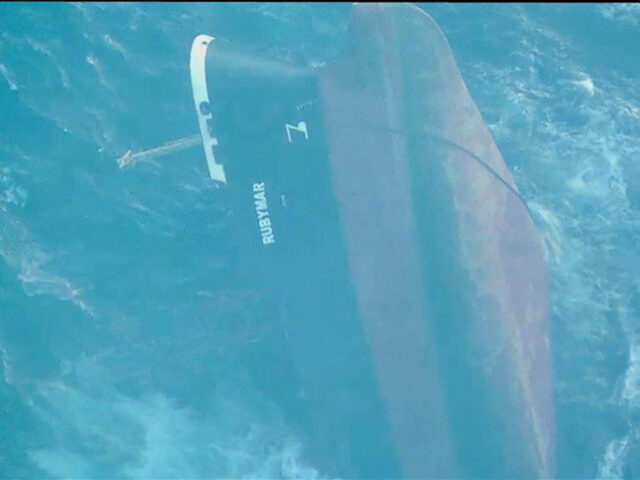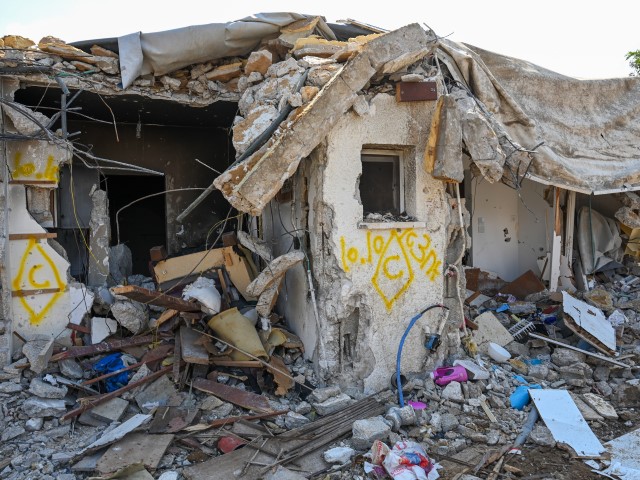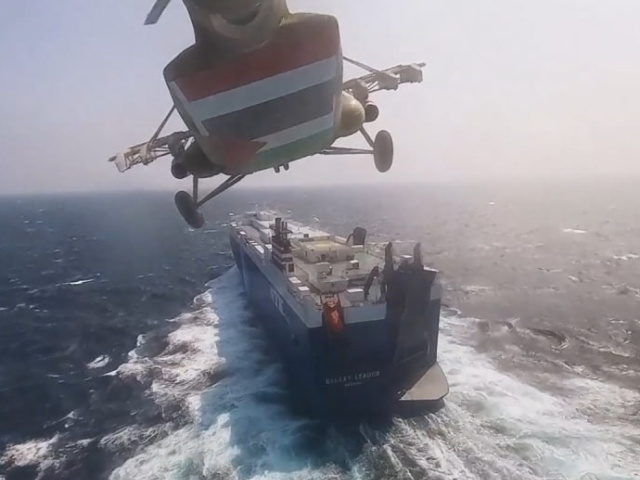
A senior leader within the Yemeni Houthi terrorist organization promised on Sunday to sink more British ships after U.K. and coalition forces confirmed the sinking of the British-owned MV Rubymar, a commercial ship with no known ties to Israel, which the Houthis struck with a ballistic missile in mid-February.
Hussein al-Ezzi, whom the Houthis refer to as their “deputy foreign minister,” claimed that the United Kingdom was a “rogue state” and a legitimate target in the group’s ongoing war against Israel. The Shiite terrorist Houthis, formally known as “Ansar Allah,” declared war on Israel in October as a gesture of solidarity with Hamas, a Sunni terrorist organization based in Gaza, which, like the Houthis, receives generous support from Iran. Hamas engaged in an unprecedented wave of terrorism against civilians in Israel on October 7, which resulted in an estimated 1,200 deaths, the abduction of more than 200 people, and widespread documented acts of gang rape, infanticide, torture, desecration of corpses, and other atrocities.

KFAR AZA, ISRAEL – OCTOBER 10: A view of a house left in ruins after an attack by Hamas militants on this kibbutz days earlier. On October 7, the Palestinian militant group Hamas launched a surprise attack on Israel from Gaza by land, sea, and air, killing and wounding multitudes. The attack prompted a declaration of war by Israeli Prime Minister Benjamin Netanyahu (Alexi J. Rosenfeld/Getty Images).
The main form that the Houthi “war” on Israel has taken is mounting attacks on seemingly random ships attempting to transit in and around the Red Sea. Houthi leaders first promised to attack only ships with ties to Israel in an attempt to hurt the country’s economy, then expanded their targets to British and American ships in response to airstrikes meant to weaken their attack capabilities. In reality, however, Houthi attacks have hit ships unrelated to the Houthis’ enemies and, on some occasions, ships with ties to Houthi allies, such as Russia, China, and Iran.
The administration of leftist American President Joe Biden responded to the Houthi Red Sea campaign by establishing “Operation Prosperity Guardian,” a coalition allegedly consisting of over 20 nations, many of which have insisted on remaining anonymous. “Operation Prosperity Guardian” has not announced any significant activity to reduce Houthi maritime terrorism and did not prevent the attack on the Rubymar or similar incidents. The most prominent actions by alleged “Operation Prosperity Guardian” members in the past month have been specified to be independent of that mission.
The sinking of the Rubymar, which threatens to become an environmental disaster as a result of the ship’s cargo of fertilizing and other chemicals, is the largest success in the Houthis’ Red Sea terror campaign so far. Ezzi, the “deputy foreign minister,” issued a warning on Sunday that more ship sinkings will follow.
“Yemen will continue to sink more British ships, and any repercussions or other damages will be added to Britain’s bill,” Ezzi wrote in a post on social media, as translated by the Iranian propaganda outlet PressTV. “It is a rogue state that attacks Yemen and partners with America in sponsoring ongoing crimes against civilians in Gaza.”
The Houthis claim that Israel’s self-defense operations against Hamas in its stronghold of Gaza, which it has governed for nearly two decades, are “crimes against civilians.”
Ezzi’s remarks follow a series of belligerent speeches from the leader of the Houthis, Abdul Malik al-Houthi, who promised “surprises” for British and American ships in his latest address on Thursday.
“The American and British attacks have not affected our military power in any way. On the contrary, the process of increasing and expanding our attacks continues,” Houthi declared at the time. “The Americans are now admitting their failure to achieve their aggressive goals against our country and are surprised by our strength.”
“Our military operations will continue and advance and we have surprises that our enemies will not expect at all,” Houthi promised.
Houthi had previously celebrated the Red Sea terrorist campaign as “continuing, escalating, and effective.”

A screen grab captured from a video shows the cargo ship “Galaxy Leader,” co-owned by an Israeli company, being hijacked by Iran-backed Houthis from Yemen in the Red Sea on November 20, 2023 (Houthis Media Center/Handout/Anadolu via Getty Images).
U.S. Central Command (CENTCOM), the Pentagon’s Middle East command, confirmed the sinking of the Rubymar on Sunday and its threat to both ship traffic and marine life.
“The approximately 21,000 metric tons of ammonium phosphate sulfate fertilizer that the vessel was carrying presents an environmental risk in the Red Sea,” CENTCOM warned. “As the ship sinks it also presents a subsurface impact risk to other ships transiting the busy shipping lanes of the waterway.”
“The Iran-backed Houthis pose a heightened threat to global maritime activities. The United States and coalition partners remain committed to safeguarding freedom of navigation, striving to enhance the safety and security of international waters for merchant shipping,” the statement concluded:
Sinking of Motor Vessel⁰Rubymar Risks Environmental⁰Damage
— U.S. Central Command (@CENTCOM) March 3, 2024
On Mar. 2 at approximately 2:15 a.m., MV Rubymar, a Belize-flagged, UK-owned bulk carrier, sank in the Red Sea after being struck by an Iranian-backed Houthi terrorist anti-ship ballistic missile on Feb. 18.
The ship… pic.twitter.com/fRUM4ll4cY
The British newspaper the Guardian cited analyst Mohammed Albasha with the Navanti Group warning that the Rubymar‘s cargo could result in a substantial poisoning of the Red Sea habitat, “depleting the water of oxygen and creating ‘dead zones.'” In addition to the risk of significant destruction of the environment, the sinking could potentially have dire economic consequences as fishermen in the region who rely on ample fish stocks find their catches fleeing the area or poisoned by the fertilizer cargo.
Houthi missiles targeting commercial ship traffic continued to be a threat throughout the weekend. The Italian Navy warship Caio Duilio shot down a Houthi drone, eliciting a menacing response from the Houthis. The Italian Defense Ministry claimed the drone was flying towards the ship, potentially preparing to attack it.
“The Houthi terrorist attacks are a serious violation of international law and an attack on the security of maritime traffic on which our economy depends,” Italian Defense Minister Guido Crosetto said in response to the action. “These attacks are part of a hybrid war, which uses every possibility, not only military, to damage some countries and aid others”:
Nave Duilio #MarinaMilitare abbatte drone nel #MarRosso.
— Ministero Difesa (@MinisteroDifesa) March 2, 2024
"Gli attacchi terroristici degli Houthi sono una grave violazione del diritto internazionale e un attentato alla sicurezza dei traffici marittimi".
Così il Min. @GuidoCrosetto
Leggi la notizia➡️ https://t.co/JubVeFvEcA pic.twitter.com/8ZS0isDosb
Houthi leaders issued a statement warning that Rome was “jeopardiz[ing] the safety of its military and commercial ships” by acting against Houthi attacks on random commercial ships.
